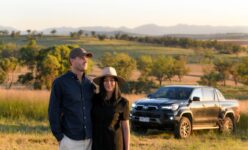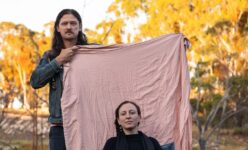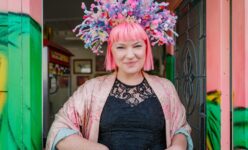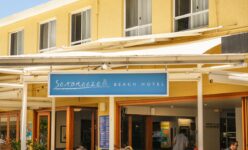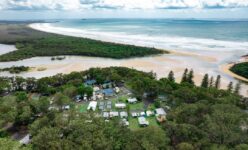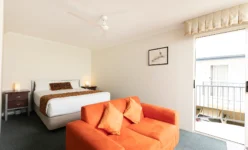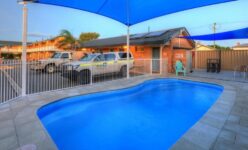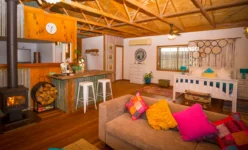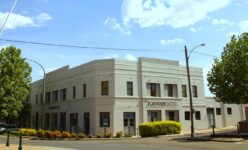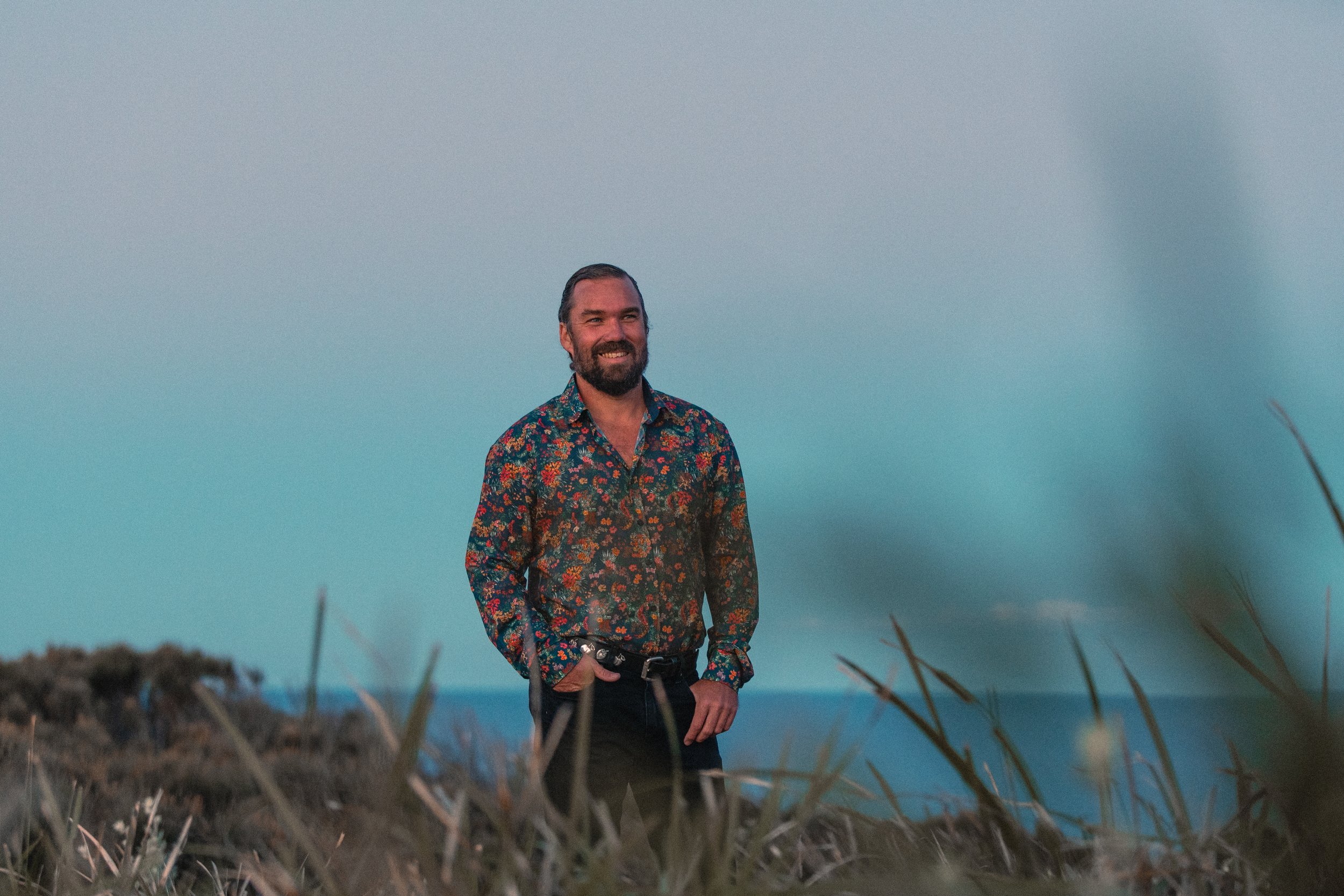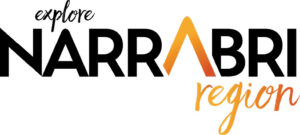Your cart is currently empty!
From the pulpit to pubs, festivals to Memphis, Sam Buckley’s journey to play the blues has been one soul-stirring, riff-filled ride.Sam Buckley heard rock and roll for the first time when he was 12 years old. The sounds swept over him, gritty and raw, pouring out of his dad’s record player – something that was previously reserved for gospel music alone. But not this day.
This was the day Santana’s soul-stirring melodies, Eric Clapton’s rule-breaking riffs and James Taylor’s folk-rock chords came flooding into Sam’s world, washing away the old to make room for something gutsy and new.
It was a baptism of rock.
“Up until that day, I’d lived a fairly isolated life – my parents were conservative Christians and steered me away from both radio and TV so my first musical experience was gospel,” says Sam.
“My dad would walk around the house, playing guitar and singing – I wanted to be just like him. He taught me my first chords when I was 11 and we’d perform together at church. I guess you could say the pulpit was my first stage.
“But I could see, deep down, dad had this love for rock and roll. I think he’d put it aside for some time due to his faith. That all changed when I turned 12, he opened up and started bringing home great music like James Taylor’s Sweet Baby James, Eric Clapton’s Cream and Santana’s Caravanserai.”
While Sam had started learning piano at the age of nine, he knew early on it was too stiff, too rigid. Listening to these albums cemented his feelings for a sound he couldn’t quite put his finger on. It was soul-stirring, edgy and raw. A gospel influence rang through, but soaring above it all came wailing guitar solos and lyrics that lingered – it was music that meant something more, grounded by a rhythmic, walking bass.
“The sounds blew my mind, but I didn’t know what it was called,” he says. “Then, one day, a family friend brought over a new album: Roy Buchanan’s When Guitar Plays The Blues. It was the first time I’d heard pure blues guitar, unadulterated and electric. That was the day my guitar hero went from Metallica’s Kirk Hammet to Roy Buchanan.
“But no matter what sound I played, one thing dad taught me stuck – he told me the most important thing about music is to play with feeling. To this day, I always try to serve the song and convey a feeling people can relate to. That’s when real connection happens.”
Blues in a bubble
It was a connection born in relative isolation for Sam. The family lived on a 100-acre farm just outside of Bellingen, and he was homeschooled until the age of 15. The majority of their food was grown in a huge vegetable garden, which Sam would plough with his Clydesdale horse, and eggs were in steady supply thanks to their brood of chickens. Outside interaction consisted of trips to the Bellingen markets to sell strawberries, sun-kissed days on the shoreline learning to surf, and assisting his dad on plumbing jobs.
“It was a very earthy upbringing,” says Sam. “By the age of 14, I was doing three days a week as dad’s labourer. I learned the ins and outs of the trade and spent a lot of time on building sites talking to people in their 40s and 50s. I could hold a conversation with any adult. But talking to people my own age was a different thing entirely.”
When Sam went to school at 15, he says it felt like he was entering the real world for the first time. Before then, he existed in a bubble and, with little experience hanging out with people his own age, he was awkward and lacked social skills. So he joined the music program.
“That saved me,” he says. “Music helped me to connect, and before long, I became the guitarist for the year 10 band. By the time I reached year 12, I topped the class in music, but failed every other subject. At that point in my life all I wanted to do was play music and surf, I just needed to find a way to get there.”
The years following high school saw Sam lean into his farmhand and labouring experience. He tended fruit trees at an Indian commune, managed a chicken farm in Lochinvar and snapped up plumbing gigs across the state. But his days began and ended with guitar.
“I decided I want to be professional, so I’d spend hours practising every day and eventually ended up at Grafton TAFE, where I completed my advanced diploma in music. I was 23 and had started playing in bands and doing gigs, but I knew to really progress, I needed to be in Sydney. Luckily I had a friend who was happy for me to sleep on his couch – so I packed up the car and drove straight there. I was ready to throw myself in the deep end.”
The big time
City life was exhilarating for the self-described ‘small-town country boy’. Sam continued to support himself with plumbing work while studying at the International Conservatorium of Music, Parramatta, where he upgraded his advanced diploma of music to a degree. At the same time, he dove into Sydney’s music scene and, within three months, secured a guitarist gig with a band called Blue Venom. They hit the pub scene hard and mastered rock covers from the likes of Gary Moore, Santana and Cream.
But Sam’s soul belonged to blues, so when he spotted an ad in Drum Media for a guitarist to Australian blues musician Anni Piper, he picked up the phone.
“Luckily, she liked my playing and my attitude – so I got the gig, and that was my first step out of the pub scene into festivals,” says Sam.
“We did a lot of touring and covered all the blues festivals around Australia. Back then, I played with a lot of fire and attitude, in the style of Jimi Hendrix and Steve Ray Vaughan. I was still labouring to make ends meet and also completed my Bachelor of Teaching at Avondale College – I was now a fully qualified music teacher but, on the professional scene, was mainly a gun for hire.
“I ended up releasing a blues rock album with Anni called Chasin’ Tail. I wrote a lot of the songs, and we got some decent radio time – it even made it to Rage. But after four and half years together, I needed a change.”
Six days after parting ways with Anni, John Durr from Black Market Music called Sam. Alongside renowned studio engineer Robert B Dillon, he was searching for a new guitarist for a band called Dreamboogie. They invited Sam to Melbourne to audition, spend the week with the other members, jam at local blues clubs and see if Sam would fit. Ultimately, he got the gig.
“That took me from Sydney to the forefront of the Melbourne blues scene – I got instant respect for making the cut, and while I still had to work my arse off musically, it saw me reach a whole other level,” says Sam.
“We did all the big festivals, the Blues on Broadbeach Music Festival, Bridgetown Blues Festival, the Fringe festivals – we were sought after and respected. We spent a lot of time in the recording studio and ended up doing three albums together, all while I was teaching music at different high schools across Melbourne.
“I learnt so much about music from those guys – we ended up experimenting with electronic loops and in time they became the centrepiece of the band’s rhythms – this gave a real driving intensity to the grooves the band played. I also learnt how to write intricate musical parts that always served the overall purpose of the song and my ears became much more attuned to the importance of the small nuances and details that make music more polished, slick and catchy. We were very structured, unique and refined, there was never any wasted space, and every piece of music had to say something relevant to the song.”
Dreamboogie’s best days arrived in 2016, when they won Victoria’s International Blues Challenge and were awarded an all-paid trip to Memphis, Tennessee – the home of the blues. They strolled down Beale Street, played at BB King’s blues club, cruised down Highway 49 to Clarksdale in a 400 horsepower Dodge Challenger, visited Robert Johnson’s grave and played with the house band at Morgan Freeman’s blues club, Ground Zero. Sam soaked up every second of his time spent in the place so integral to the history of blues music.
But when it came time to compete in the semi-finals, Dreamboogie’s winning streak had run out – along with Sam’s desire to stay with the band.
“We tried to hang on a bit longer and entered the blues competition again in 2019 – we were favourites to win, but didn’t play our best and came runner-up instead,” he says. “From there, we all started going in different directions, we wanted different things.”
Sam knew what he wanted – to be a frontman. Then Covid hit.
Buckley’s blues is born
Sam and his partner Amelia were holidaying in Byron Bay when they heard the news. They quickly made their way back to their two-bedroom apartment in Melbourne and dove into the strange new world of teaching online. But where others might have seen five months straight of a stage five lockdown as a challenge, Sam saw opportunity.
He stole every spare moment to practice in the bedroom, developing his own sound and asking himself: ‘who do I want to be?’, ‘am I acoustic or electric?’, ‘how do I want to present myself?’. When he was ready, Sam set up a stage and Buckley’s Blues was born.
“I launched myself in the lounge room – that’s where I’d do live streams every week and people would jump on to listen to my sound,” says Sam.
“That’s when I really started working on my vocal beats and refining my style. I wanted to be something different, because finding small points of difference in art is how you set your own brand, give yourself a direction you can follow and express yourself in your own unique way.”
And Sam’s way is certainly unique. He creates all his sounds live, starting with a rhythm part on acoustic guitar. A pedal then enables him to switch over and get a bassline from his acoustic – laying that down with his acoustic rhythm. The combination of the two forms a locked-in, repeating loop. From there, Sam operates a kick snare pedal with his left foot and plays his electric guitar and sings over the top. It’s a raw, organic sound created wholly in that moment.
“That’s the crux of Buckley’s Blues,” he says. “I’ve done a lot of metronome work and refined the grooves. It’s very clean, sharp, precise and slick. It makes you move. And that’s the sound I’ll capture on my first album.”
After moving back home to his parents’ 100-acre property in late 2021, Sam’s been working on his inaugural album for the past year, with his now fiance Amelia and their dog, Bear, by his side. It’s an artwork set in motion thanks to the support of Memphis blues royalty including: Lester Snell (arranger / piano / keys), Reverend Charles Hodges (organ), Willie Hall (drums / percussion), T.O. Crivens (rhythm guitar), Ray Griffin (bass) and Lawrence ‘Boo’ Mitchell (Grammy award-winning studio engineer and owner of Royal Studios where the album is being recorded).
“These guys are living legends, the original Stax Records players, the greatest blues players in the world,” adds Sam. “I was so lucky to be introduced to Lester through a friend and I put myself out there and sent him two of my original songs. He wrote back and said he loved my sound and direction and before I knew it we’re working on a 10-song album together. The first track will be released late 2022, with the full album to follow in 2023.
“I have so much reverence for these players and what they’re doing for me. This is a once-in-a-lifetime opportunity, and I’m here for every soul-inspiring, blues-soaked second of it.”
Blue Ocean
Guess what friends?! Sam Buckley’s debut single, Blue Ocean, is out now! Have a listen here now. To see Sam at home on stage and stay up to date with his upcoming performances, follow him online stat.
Website | Instagram | Photography Jackson James


